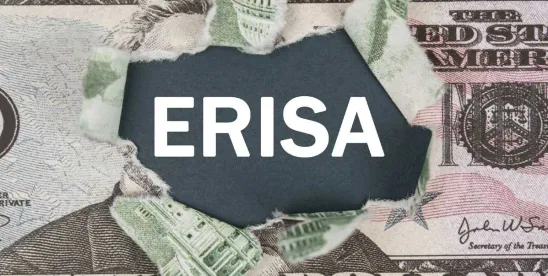Two recent class action lawsuits charging a breach of fiduciary duty under the Employee Retirement Income Security Act (ERISA) have increased the stakes and raised important considerations regarding a plan fiduciary’s duty of loyalty/prudence and engagement in prohibited transactions. This follows a string of cases over the years that have expanded the responsibilities of ERISA fiduciaries in the context of the use and investment of retirement plan assets.
Quick Hits
- The U.S. District Court for the Northern District of Texas recently ruled that an employer breached a duty of loyalty to plan participants by permitting an investment manager to invest retirement assets in holdings based on nonpecuniary environmental, social, and governance (ESG) factors. A major factor in the case was that the CFO of the employer also acted as the fiduciary overseeing the plan asset investment managers.
- The Supreme Court of the United States recently ruled in another case that involved allegations of prohibited transactions under ERISA, 29 U.S.C. § 1106(a)(1)(C). The main issue was whether a plaintiff is required to plead facts addressing the elements of a prohibited transaction exemption under 29 U.S.C. § 1108(b)(2)(A) in order to state a viable prohibited transaction claim under 29 U.S.C. § 1106(a)(1)(C).
First Case
In a recent class action filed in the Northern District of Texas against an employer and its fiduciary committee responsible for several 401(k) plans, the plaintiffs alleged the fiduciaries had breached their duties to the plans when investing plan assets in ESG investments. The court ruled that there was no breach of the duty of prudence but found that there had been a breach of the duty of loyalty.
Duty of Prudence
The court concluded that there was no breach of the duty of prudence concerning the selection and retention of investment managers. According to the ruling and ERISA’s relevant provisions, fiduciaries are required to perform their duties with “the care, skill, prudence, and diligence under the circumstances then prevailing that a prudent man acting in a like capacity and familiar with such matters would use in the conduct of an enterprise of a like character and with like aims.” 29 U.S.C. § 1104(a)(1)(B).
Most prudence claims are process-focused. A key factor in the court’s decision was the robust process the employer maintained for monitoring, selecting, and retaining managers in the plans’ core investment lineup. The court found the employer and fiduciary committee’s method to be thorough and well-documented. Additionally, the court viewed favorably the defendants’ efforts to mitigate risks by hiring an external, industry-leading consultant to continuously monitor all aspects of the plans.
The court emphasized that the duty-of-prudence analysis is “inherently comparative” and objective, relying on how fiduciaries should act “consistent with prevailing industry standards.” This comparative approach underscores the importance of adhering to industry norms and best practices in fiduciary decision-making.
Duty of Loyalty
In contrast to the first ruling, the court determined that there had been a breach of the duty of loyalty because the employer’s interests were intertwined with the investment manager’s. ERISA’s duty of loyalty is the “highest known to law,” requiring fiduciaries to act solely and exclusively in the best interests of the plan’s participants and beneficiaries. The court ruled that this standard had not been met.
A significant concern for the court was the undue influence the investment manager had over the employer, evidenced by its ownership of approximately $400 million of the employer’s fixed income debt and 5 percent of the employer’s stock.
Another critical issue identified by the court was the dual role of the employer’s chief financial officer (CFO), who managed the day-to-day operations of the investment manager while also holding a fiduciary duty to the employer as an officer of the company. These conflicting interests were exacerbated by the CFO’s admission that the relationship between the employer and the investment manager regarding ESG investments was circular. The court found that these overlapping interests and roles regarding plan and employer compromised the fiduciary duty of loyalty, highlighting the need for clear and uncompromised dedication to the best interests of plan participants and beneficiaries.
While the court found that there had been a breach of the duty of loyalty, it did not outright prohibit plan fiduciaries from looking at ESG factors for investment plans. In State of Utah v. Micone (February 14, 2025), the U.S. District Court for the Northern District of Texas upheld a 2022 U.S. Department of Labor regulation allowing fiduciaries to consider ESG factors if the factors served as a tiebreaker between equally beneficial financial options. The court emphasized that financial benefits must be the sole and primary consideration, with ESG factors considered only after confirming the financial benefits of an investment for the plan beneficiaries.
Second Case
The Supreme Court of the United States reviewed a case brought by employees who participated in a university’s 403(b) plans from 2010 to 2016. Among other claims, the employees alleged that payments made to the plan’s service providers were prohibited transactions under ERISA, 29 U.S.C. §1106, due to excessively high recordkeeping fees. The district court dismissed the employees’ prohibited transactions claim, and the U.S. Court of Appeals for the Second Circuit affirmed, primarily based on the courts’ conclusion that the employees were also required to plead facts supporting the nonapplication of relevant prohibited transaction exemptions in §1108.
Before the Supreme Court, the employees argued that §1106(a)(1)(C) of ERISA prohibits all transactions between plan fiduciaries and service providers and that the exemptions in §1108 are affirmative defenses that a defendant must plead and prove. The fiduciaries argued that plaintiffs must also plead and prove that the exemption facts negate application of the §1108 exemptions.
On April 17, 2025, the Supreme Court reversed the Second Circuit’s decision. The Court held that §1108 exemptions are affirmative defenses and that “defendant fiduciaries bear the burden of pleading and proving that a §1108 exemption applies to an otherwise prohibited transaction under §1106.” This holding drastically reduces the requirements for plaintiffs to plausibly allege that a prohibited transaction occurred, and it will likely expose fiduciaries to greater potential liability and expense because it will lead to more prohibited transaction claims getting past the pleading stage, forcing defendants to engage in expensive discovery.
Next Steps
Plan sponsors may want to review the makeup of their fiduciary committees to ensure they do not include high-ranking members who have a conflict of interest to the employer stemming from their duty of loyalty to the company as an officer or director. Instead, plan sponsors may want to consider appointing individuals who, while perhaps holding a lower rank such as a manager, are still knowledgeable about investments to make prudent choices for the plan.
Plan sponsors may also want to ensure that their committee delegation is properly documented, and that the fiduciary committee is actively fulfilling its responsibilities. It is crucial that the committee members possess a thorough understanding of their responsibilities, including investments and fees associated with the plan.
When selecting a plan vendor, a plan sponsor may want to verify whether the vendor holds a significant ownership stake (e.g., at least 5 percent) in the employer and make note of other external influences that may sway investment decisions.
Finally, ERISA requires plan fiduciaries to conduct proper due diligence of the investments, their returns over time, and the fees being paid by the plan as compared to other similarly situated plans.





 />i
/>i

